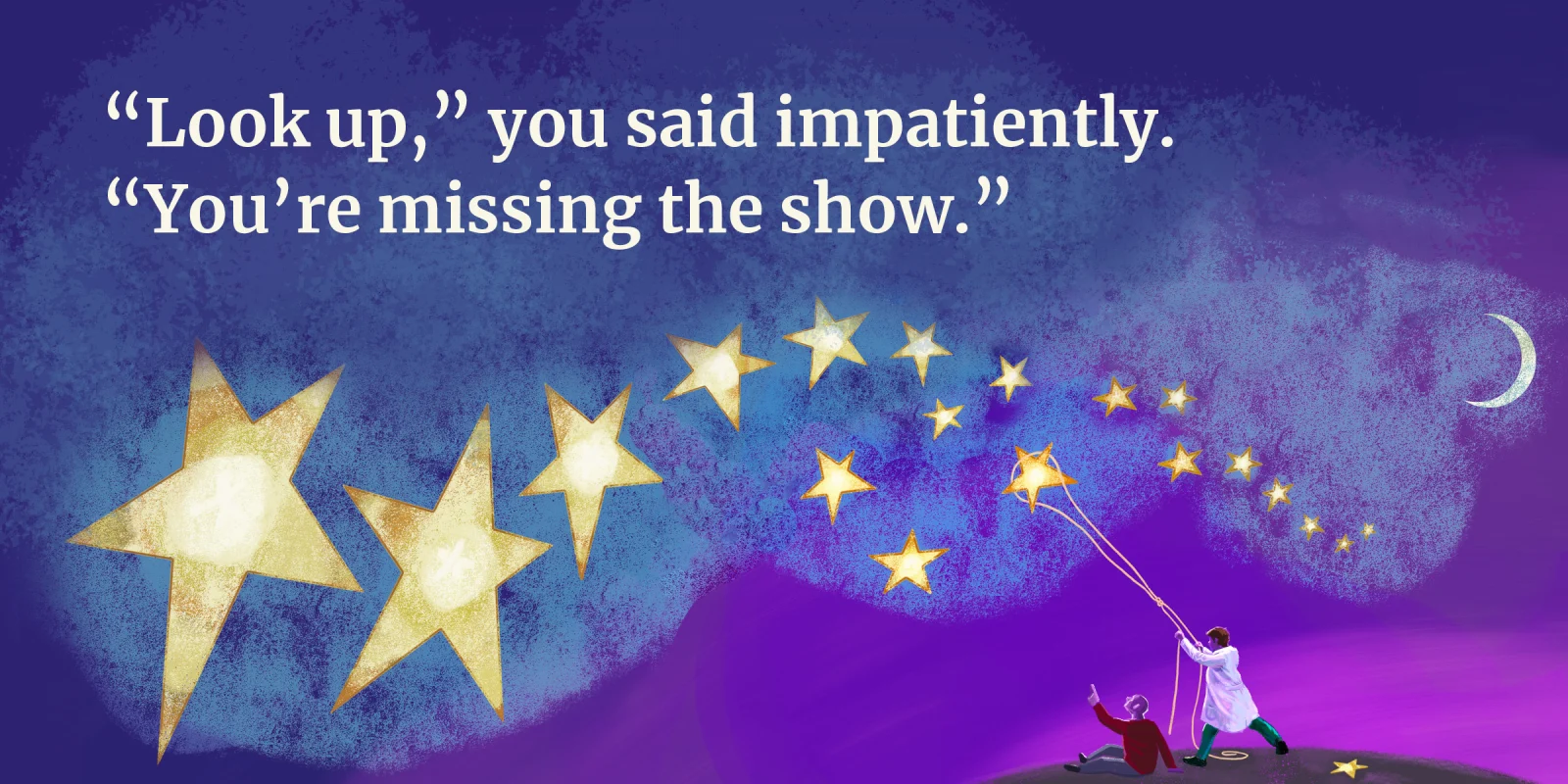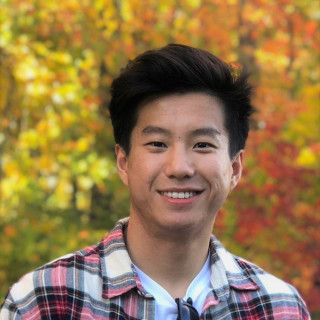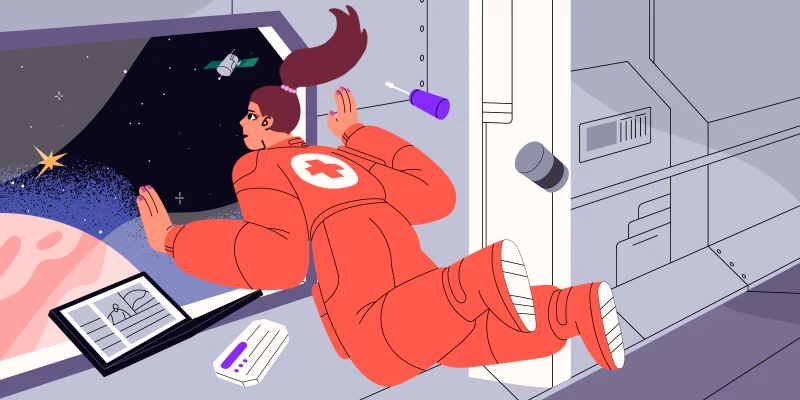This work of fiction is part of the Medical Humanities Series on Op-Med, which showcases creative work by our members. Do you have a poem, short story, creative nonfiction or visual art piece related to medicine that you’d like to share with the community? Send it to us here.
The Impossibility of Sharing
“Look up,” she said impatiently. “You’re missing the show.”
Laughing, I adopted the same pose, placing my hands back onto the cement. It was sandpaper rough but oddly soothing.
“There’s not much to see yet,” I said.
“Just be quiet,” she whispered.
We sat there in silence. It was a windless night. And it was still — the way a busy subway station presents at 6 a.m. on Saturday. That meant there was an overwhelming sense of absence, which is also different from the emptiness we know exists but cannot see.
After 10 minutes, I was about to break into conversation when she leaned hard into me. All 90 pounds of a frail frame made brittle from chemo, buoyed by her teenage youth.
“Look!” She pointed to the right, and I caught the faintest tail of a white streak vanishing in the pitch-black sky.
Remember, don’t focus on any specific section of the sky. Try to take it all in, but keep your gaze unfocused. But not too unfocused — just enough so you can get the widest view possible. Then, when a meteor arrives, you can follow it. And you won’t even be surprised because it will have simply appeared. But make sure to give a short shout or any exclamation so I’ll know too. You see, catching a meteor is easy, but sharing it with someone else is almost impossible.
She turned quickly. “Did you see it?” She exclaimed excitedly, her face aglow in awe.
I nodded silently and pointed up. The sky was almost noticeably brighter with afterglow. And for the next hour, we must have seen more than 15 meteors. There was no way to describe it except magical. Streaks of white light dashed in and out, transiently folding the sky into random shapes, but with an order one could interpret if given meaning.
When the shower was over, I stood up and dusted off my navy scrubs, even though nothing was on them.
She stayed sitting, eyes still looking up but away from me.
“I wish the meteors would come again.” She said in a quiet voice. I had to lean down to catch the end of her sentence.
“They come every year. You’ll always be able to see them, if the night’s clear and the skyline is dim enough.”
“That’s not what I mean.” She looked over at me. “Can you sit back down and continue watching with me? The stars are pretty enough even without the meteors.”
If, by chance, you can alert your partner to the meteor's position, and they respond quickly enough, you can both see the meteor. And to most watchers, this would be deemed a significant accomplishment. You could both revel in the wonder of having seen something so fleeting. The type of beauty that exists more in memory than reality. At the same time, you’ll both feel a tinge of sadness, knowing that this isn’t quite sharing, but the closest attempt to it. For what you and I see is never quite the same. The timing is always slightly off, the distance between never close enough.
I sat back down and dug my hands into the roof again. They hurt less this time.
She let out a big sigh and looked at me before craning her head back up. “What’s your favorite constellation?”
“To be honest, I know nothing about constellations. I do like stargazing though. There’s something magical about shooting stars.”
She let out a laugh, covering your mouth. “I’ve known you for five years. Since day one, I thought doctors knew everything. I learned something new today.”
“Believe me, I know everything about your cancer.” I said with a guilty smile. “But with the stars, you’re the teacher now.”
“And that’s quite alright.” She said, a sly grin emerging under the curtain of moonlight.
I chuckled and joined her in looking up. “I wonder if there’s a metaphor for life in stargazing. Admiring something you can never be close to. And still, inevitably drawn to it like moths to flame.”
She pursed her lips, getting ready to politely disagree. “I think I agree with you. But we have certainly constructed closeness. After all, the stars, even groups of stars, have names.”
“The first astronomers must have been lonely. I wonder if the stars they named were for people they loved.”
There was a long gap in the noise. I found myself holding my breath just as audiences do when the conductor raises his baton before the symphony begins. And I looked over at her. She was crying silently. Hastily, I reached into my front pocket and handed a couple of napkins to her.
“Are you alright?”
“I’m dying. How can I be alright?”
“We don’t know that.”
“We moved to comfort measures only last week.” She answered. “It’s only a matter of time.”
I looked at her silhouette ensconced by the twinkling glow of city lights. Looking at her, I felt something move inside me. “Can I tell you something I’ve never told anyone at this hospital?”
She looked at me curiously, her tears were temporarily forgotten. “What’s that?”
“Why I agreed to go stargazing with you tonight.”
“Go on.”
“I lost my husband last year. We spent 50 years together. When he died, I was inconsolable. My world became colorless. The type of loneliness you feel while traveling alone in a packed train station.”
“I’m sorry.”
“Don’t be. The point is, over the past year, I’ve wanted to say goodbye to this world more days than not. But you know what kept me going?”
She rolled her eyes. “Don’t say it’s me.”
“You. My patients. You’ve saved me in more ways than you can imagine. Talking with you, hearing about your dreams, the things you love, the things you find wonderful. In many ways, tonight has reminded me why I love what I love, of who I am at my core.”
“So you only agreed to come tonight because stargazing is something your husband enjoyed?”
“Well, no one else was volunteering. But also more about what stargazing represents. Futile efforts that coalesce into brief blips of love and an undeniable purpose for being, despite our separation forever.”
She was silent for a while. “Sometimes, you still manage to impress me."
“I learned to appreciate stargazing from my husband. He loved what it stood for. And in the months after he left, all I did was look. Most nights, I’d see nothing, but when I did, I’d let out a big shout in case he was watching with me. Maybe it was grief, but also, it was purpose.”
She smiled. “You’re a wise old gal. Talking about something else to divert my attention away from my impending death.”
“I’m not diverting anything, just using a different lens. Thinking about it your way is terrible. Unfair. Horrible to think about, and don’t you think I haven’t thought about it too. But moments like this make this short, ugly life just a bit more bearable. It transcends our purpose here.”
“That doesn’t make up for the fact I’ll be gone soon.”
“And knowing that, you still asked me to come stargazing here with you. Sharing this night of unrequited hope, living in this space bursting so full of words yet to be spoken. And haven’t you noticed? Colors and sounds and sights you would have never noticed start to pop up. You are making the world more beautiful. Marvel at this power you have. You’ve taught me invaluable lessons I will carry for the rest of my life. Just being here, sharing this space with me, you’ve healed me more than I could ever do for you.”
She wiped her eyes and smiled sadly at me. “I hate it when people tell me how sorry they are for me. I wish they could be more like you.”
“Give you long, confusing philosophical speeches about the purpose and an irrational appreciation for life?”
She hugged me tightly. “You know what I mean.”
Suddenly a flash of white streaked across the sky. She pointed towards the left just as I did. We turned to each other in shock. “Did you see it?” I said, just as you repeated the same thing.
Before we left, we waved goodbye to the stars. They appeared softer; the shapes were easier to make out. As if they had grown alongside us.
“Thank you,” she whispered to the sky as we left.
And soon, you’ll be left always yearning for more. To live continually in the possibility that the next one, or the next one, or the next, will be the one where you perfectly capture and share another moment. And then, you’ll both hold it forever and be at peace.
An Interview with the author
What was your inspiration? Did other creative works, if any, influence your creation of this fictional narrative?
My inspiration was my own experiences in speaking with patients, especially those with terminal diagnoses and illnesses. Another creative work that influenced the creation of this piece was the film "5 Centimeters Per Second," a heartbreaking film about distance between loved ones and the stark reality of life and how sometimes we don't get happy endings. And yet, though happy endings may only exist in fiction, sometimes how we seek to interpret an ending — no matter how abrupt — makes all the difference. Many times, that interpretation is even more important than the event itself.
How long have you been writing? What got you started?
I've been writing ever since high school. Since then, I've had numerous opportunities to share my work, from the White House to schools and libraries across the nation. Each experience has been humbling and energizing, showing me that my work and voice matters. In medical school, I've found that writing serves as a conduit for self-healing and a space for communal healing and connection. My stories and poems now mostly revolve around the patients I see and the experiences I live through as a medical student, and I seek to use writing as a way to continue to explore the world and bring pieces of healing and growth to those who read it.
Why did you choose a short narrative style? What interests you about it?
I used to write poetry exclusively. And while I still write poetry, I have started to fall in love with the short story medium, as it gives me more space to fully verbalize what I intend while allowing room for the mysterious power lyrical poetry and imagery has. I love the visual nature and rhythm of poetry, but I am also drawn to the concreteness and dialogue of fiction, so the short story seemed to be a happy blend of the two. Even with the structure of the short story, I still like to bring in elements from poetry.
How does this submission relate to your medical practice?
In many patient conversations I am often struck by how a disconnect emerges between patients and clinicians, some imposed by hierarchical structures of hospital systems, others artificially constructed based on the type of clinician or patient. We create distance between ourselves, and it makes it difficult to truly share how one is feeling. This story attempts to show the deep humanity rooted in everyone, regardless of whether we wear scrubs or hospital gowns, and to show that despite these differences, we can truly share in the emotions and experiences that define our existence, and do so proudly with the vulnerability of sharing openly.
David Xiang is a writer and student at Harvard Medical School. He previously served as a 2015 National Student Poet, the nation's highest honor for youth poets. His works can be found in JAMA, Palliative & Supportive Care, Lancet Psychiatry, Journal of General Internal Medicine, among others. He writes to bring people together and to heal. He is a 2022-2023 Doximity Op-Med Fellow.
Illustration by Jennifer Bogartz; Collage by April Brust





